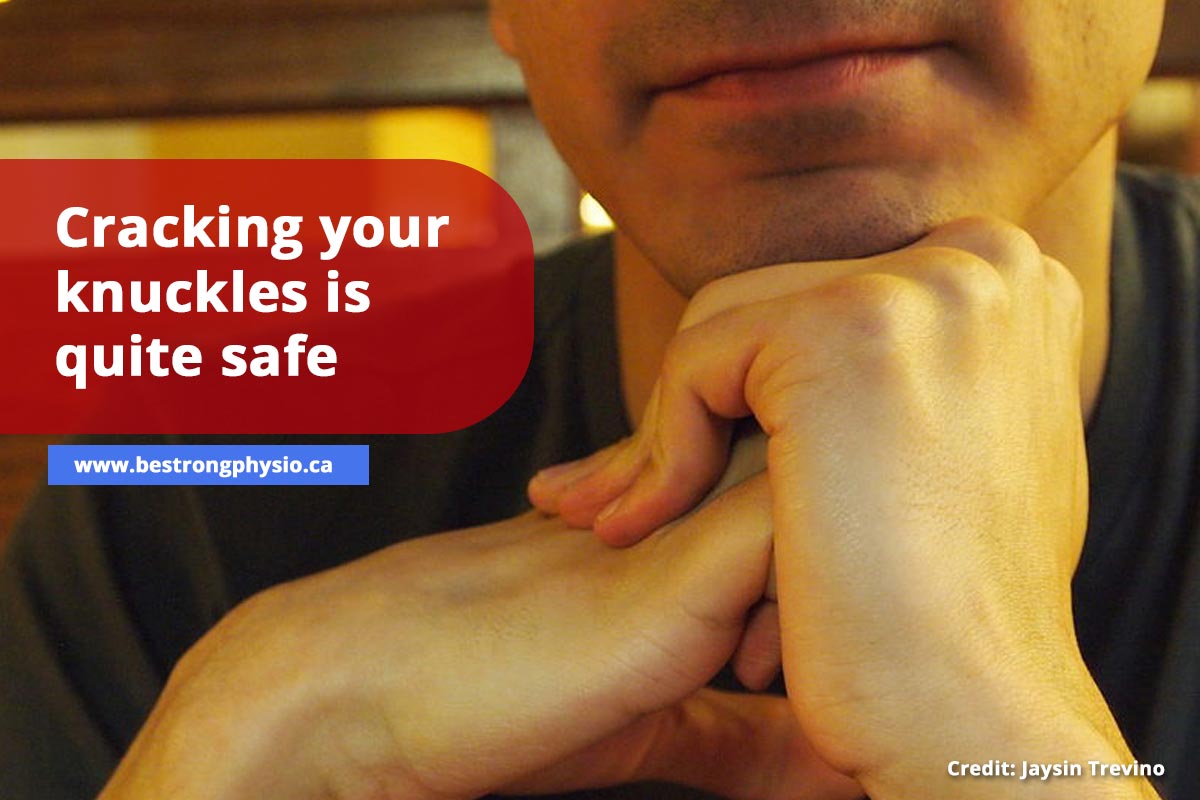Why Are My Joints Cracking?
Lost of people experience joint cracking now and then. However, it can be alarming if your ankles and elbows start popping without any warning. When this happens, some people become quite concerned that health complications like arthritis are rearing their ugly heads. While this could be possible, joint cracking on its own, without additional signals of arthritis, isn’t something to worry about.
So, Creaking Joints Are Safe?
If you’re worried about joint popping being dangerous, don’t be. No evidence has indicated that normal joint popping and cracking causes any damage. On its own, cracking doesn’t signify any underlying health problems, like arthritis.
Many people notice that popping joints get more common as they age. That’s to be expected; over time, your cartilage can gradually wear down. This makes the surfaces in your joints rougher, so you get more noise as they rub against each other.
What About Cracking My Knuckles?
You may have those stories that cracking your knuckles is bad for you. Supposedly, that hurts your joints and gives you arthritis later in life. The truth is knuckle-cracking is that knuckle-cracking is safe. Nitrogen bubbles can develop inside your joints and, with time, they can get compressed. The cracking sound when you crack your knuckles comes from cavitation, which is just the gas bubbles popping and the gas escaping.
It’s a safe process and not a cause for concern. Those stories about giving your hands arthritis or making your knuckles too big are old wives’ tales.
Okay. So Why Do Other Joints Crack?
There are plenty of reasons why your joints might crack or pop. In order of concern, these causes include:
- Nitrogen bubbles – Joint tissues typically make and contain a fluid called synovial fluid. This fluid helps keep the joints lubricated and protects them from abrasion. Nitrogen is a component of synovial fluid and can form bubbles in the joints when the pressure on the joint is uneven. This is called “hydrodynamic cavitation.”
When your joints pop, you are hearing the sound of the bubbles being reabsorbed by the liquid. This can happen when you walk, exercise, or get up from a resting position. If you’ve noticed you only hear them pop when you initially move, that’s because the pressure in the joint has equalized from your movement.
- Ligament movement – Ligaments are made up of strong connective tissues that link bones together. When you move suddenly, your ligaments might still be tight and move out of place. The popping sound is due to the ligament snapping back into place. Sometimes, this can cause pain, but not always.
- Manipulation – You may also notice joints popping and cracking during therapy (e.g. massage therapy). During these sessions, therapists manipulate any tight joints to release them and help them move.
- Rough joint surfaces – Rough bone surfaces can develop over time as a result of cartilage loss due to ageing. These surfaces can cause loud noises coming from your joints as you move. However, rough surfaces can also be caused by bone spurs associated with osteoarthritis. Keep an eye out for any pain to help you tell how serious it is.
- Surgery – Popping can be more frequent if you’ve just had joint surgery or suffered an injury. As you heal, the popping usually stops. Healing helps the joint regain its old flexibility and range of motion, preventing it from making noise. However, the condition can continue if the ligaments form scar tissue known as adhesions. Follow all instructions during recovery to ensure your body heals properly.
- Serious injury – Injured tendons and ligaments are known to make popping sounds when they are damaged. This is common in cases of dancer’s hip, also known as ‘snapping hip syndrome.’ These injuries are usually accompanied by immediate, severe pain and swelling. If you experience significant pain or any other symptoms when you hear a joint crack or pop, consult a medical practitioner right away.
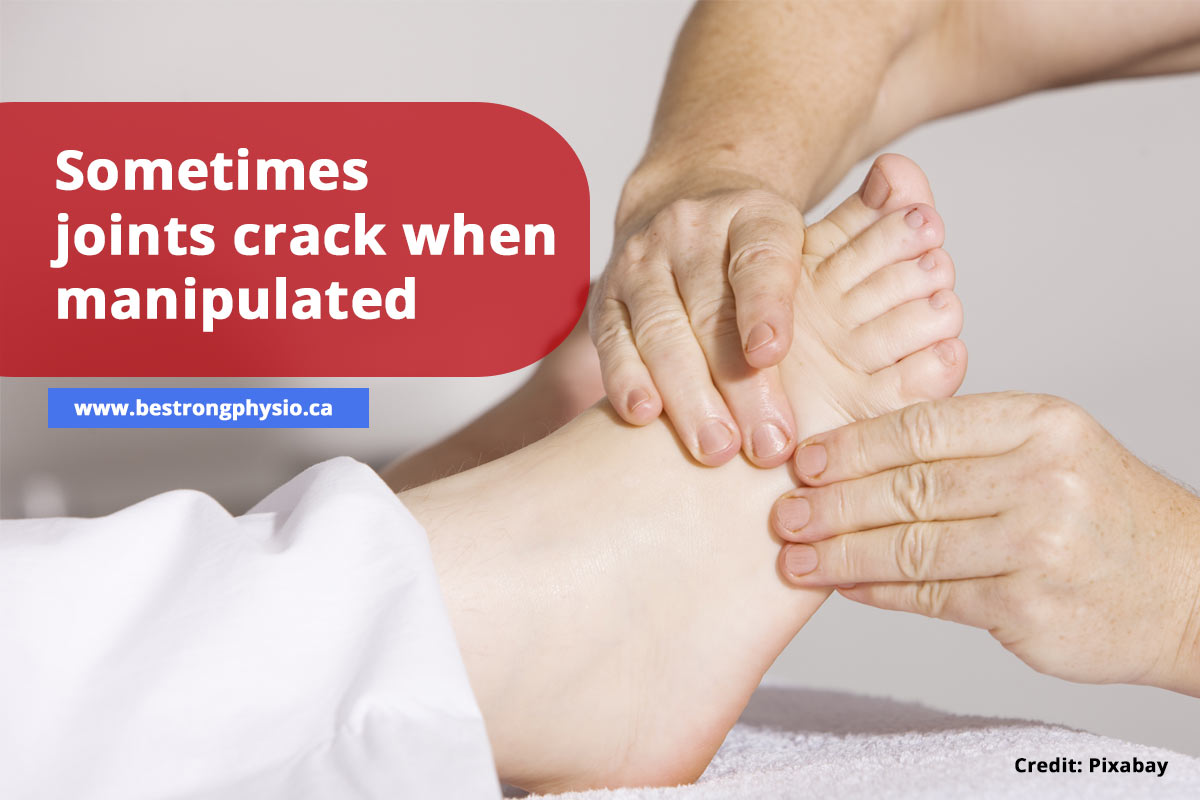
In general, popping joints aren’t usually a problem. However, when you notice other symptoms (like pain, swelling, or bruising), seek help immediately. These signs together can be indicators of serious problems that need physiotherapy services or other treatments.
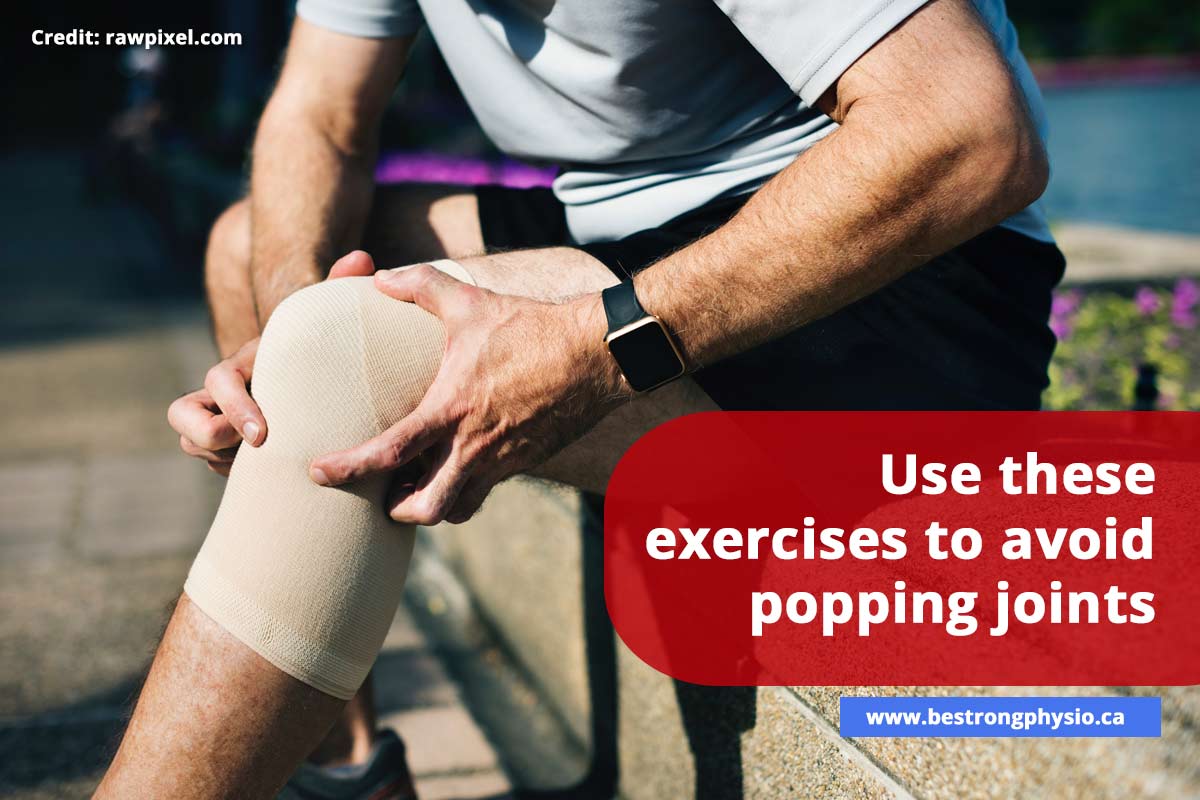
How Can I Avoid Creaking Joints?
If you’re concerned about cracking joints, there are a few things you can do about them. Movement is the key; get up and move your joints as much as you can during the day. Try these activities to keep your joints limber and lubricated:
- Stretch your neck – If your neck is prone to creaking, try some gentle stretches to promote spinal health. Face forward, then tilt your head to the left and bring your ear close to your shoulder. Hold that position for 30 seconds, then repeat on your right side.
- Perform Y, T, and W stretches – These stretches help loosen up your shoulders and keep them active. For Y stretches, raise your arms so your body forms a “Y” shape; extend your arms and fingers as far as you can and hold for 30 seconds. Then form the shape of a “T” and extend your arms and fingers for another 30 seconds. For “W” stretches, from the “T” position, bend your elbows with your palms facing your head so your arms resemble a “W.” Hold the pose for 30 seconds, then lower your arms to your sides.
- Do knee bends – During breaks at work, sneak in a few (ten or twelve) knee bends. Stand with your feet hip-width apart and arms extended in front of you. Bend your knees to lower your body roughly 10 centimetres, facing forward as you bend your knees. Keep your back straight and your knees aligned with the second toe on each foot. Avoid extending your knees past your toes. Stay down for one or two seconds each time before returning to the starting position.
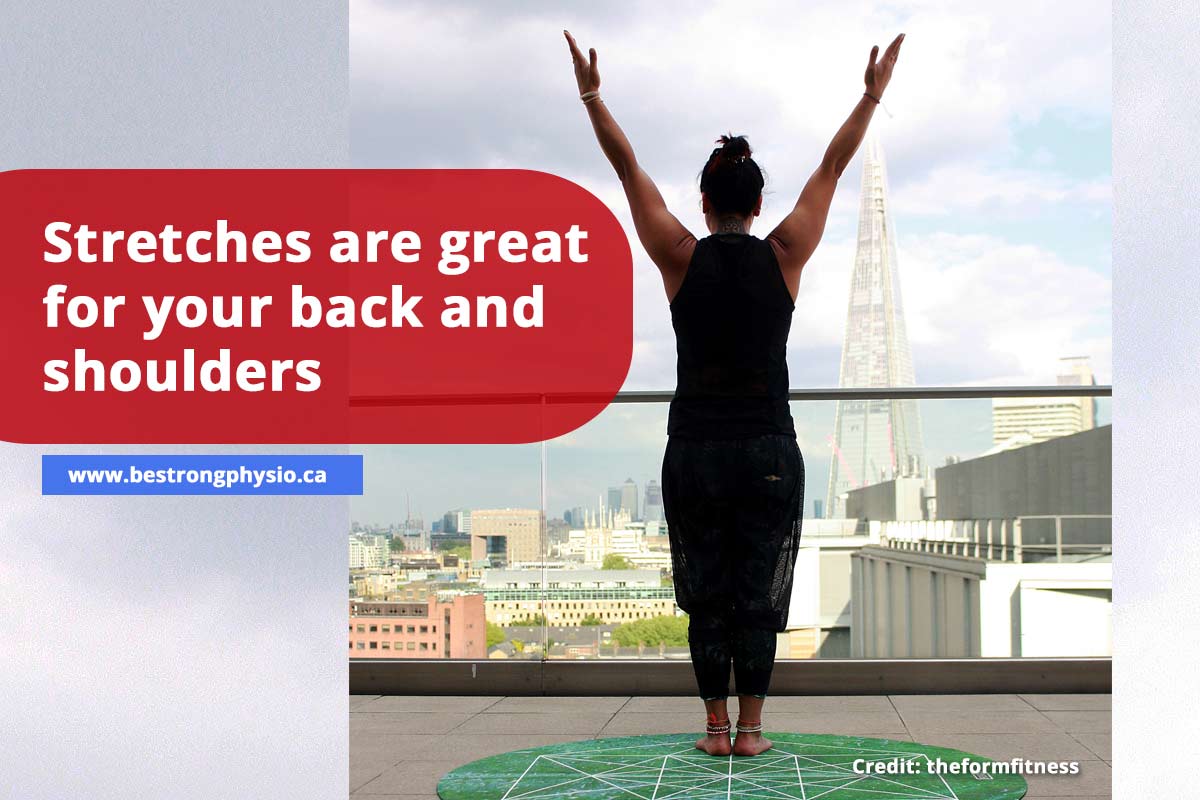
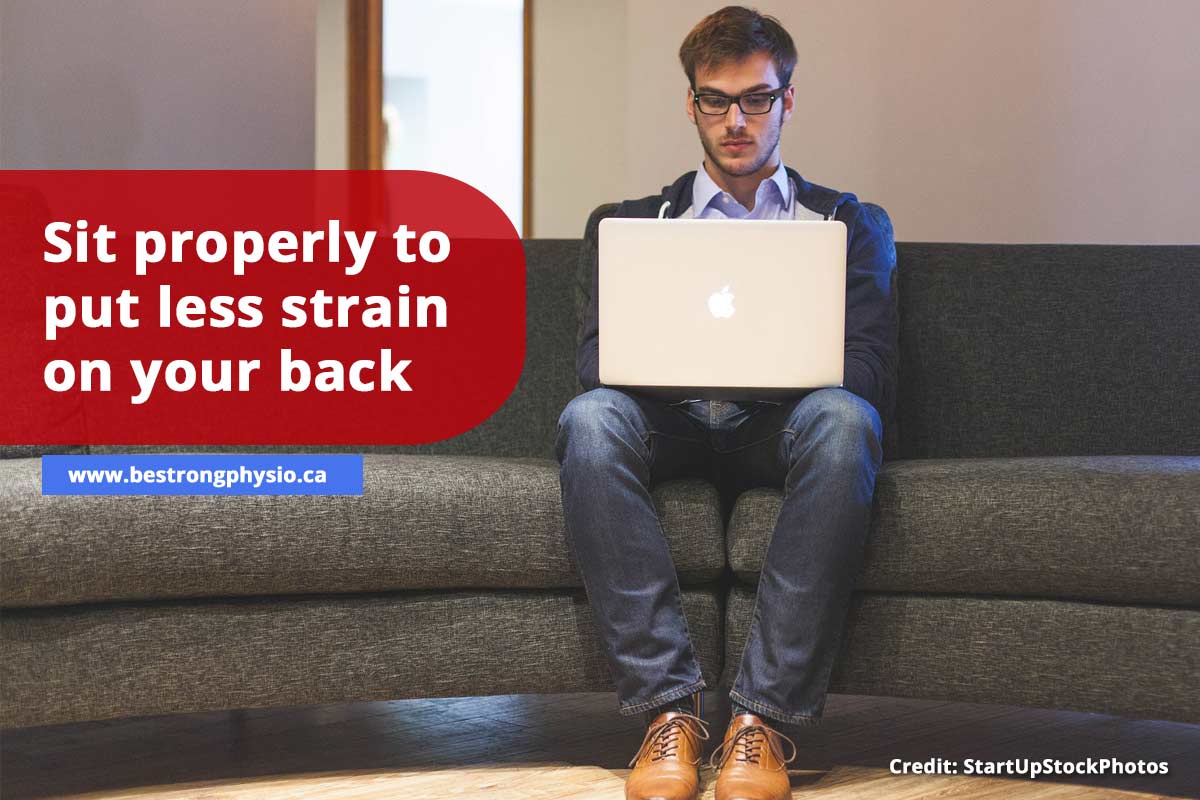
Is There Anything Else I Should Do?
Yes; stand up and move around a bit more. The best way to promote smoothly-functioning joints is through movement and a proper stance while sitting.
Too much sitting can be detrimental to your back’s health. Good posture offers benefits to help avoid pain protect your joints from damage. When sitting down, make sure you sit upright with plenty of back support and keep your feet flat on the floor. Try getting a small lumbar pillow to support the curve of your back.
Adjusting your walk can also keep the joints in your back healthy and fit. Walk with your chest lifted, and keep your knees, hips, and feet aligned. Stay upright as you walk, and avoid slouching or looking down at your phone. Avoid allowing your ankles to roll, your knees to collapse inward, or your hips to tilt up and down.
The best part about these exercises is that you can find time to squeeze them into your normal day. A few adjustments to your day can go a long way toward helping you stay fit.
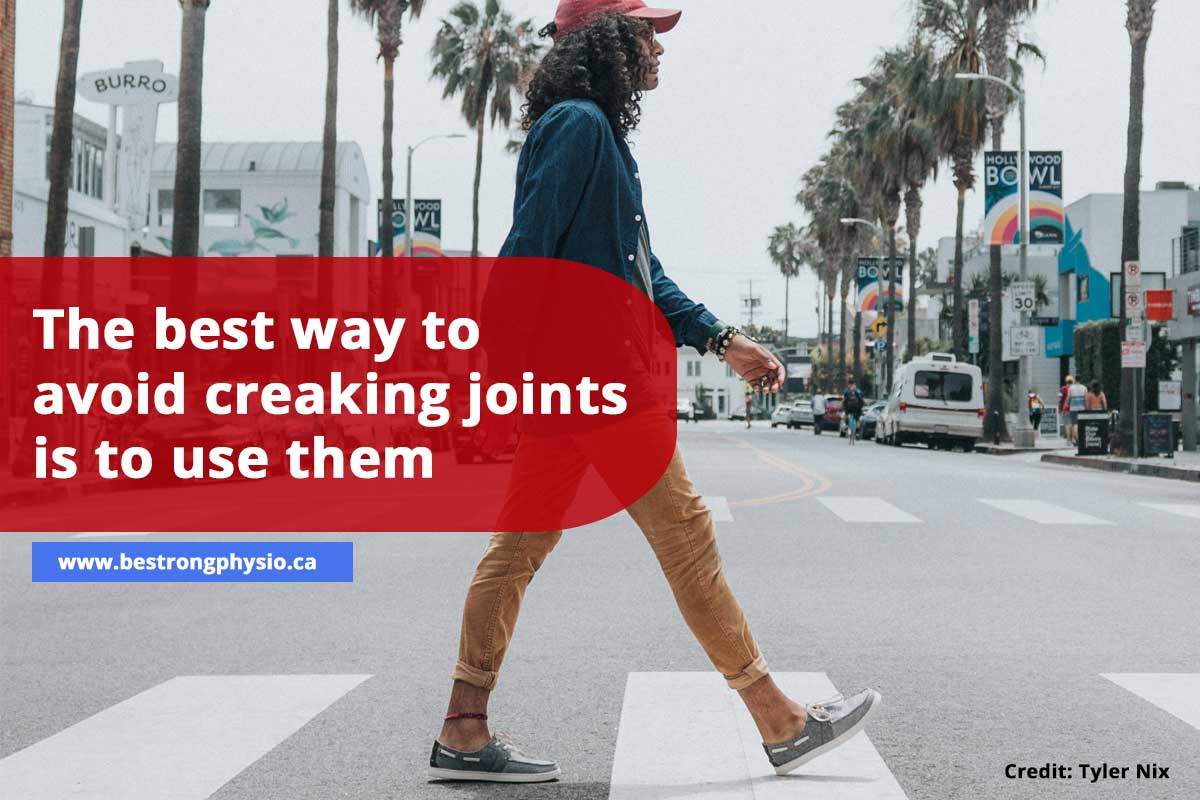
Be Strong Physio offers a range of services to help you recover and get back to health, including massage therapy and orthopedic care. We have treated an array of patients, from athletes to police officers, giving us plenty of experience when treating your ailments. Give us a call at (416) 792-6440 or visit our contact page, and we’ll prepare an individualized treatment plan for your physical and mental needs.





